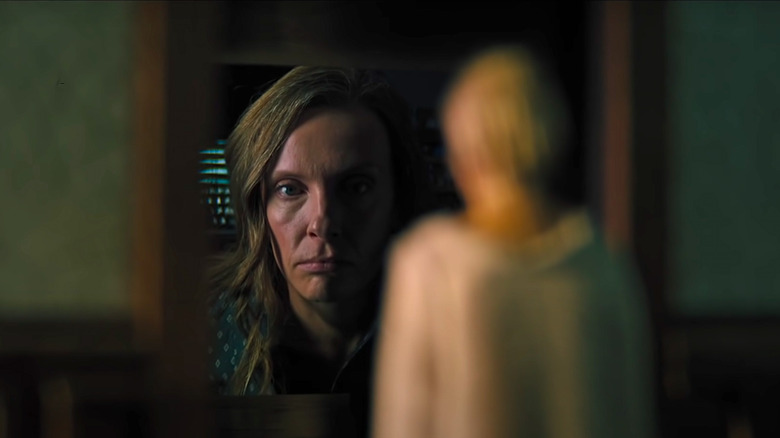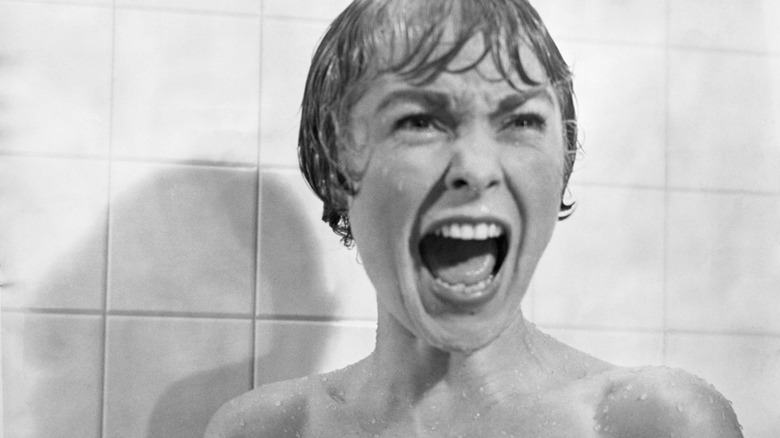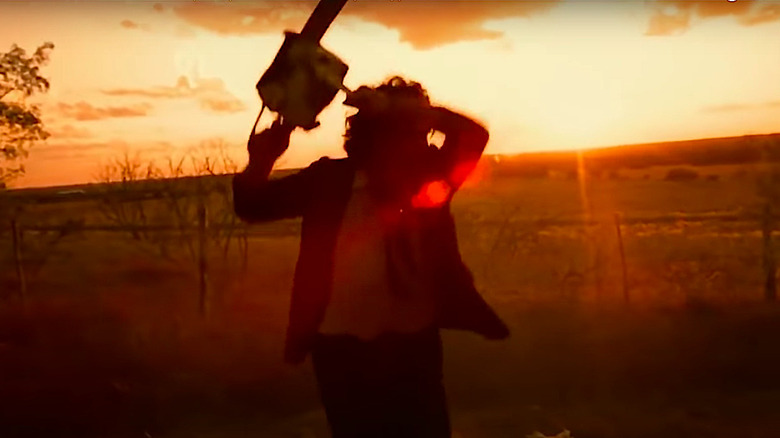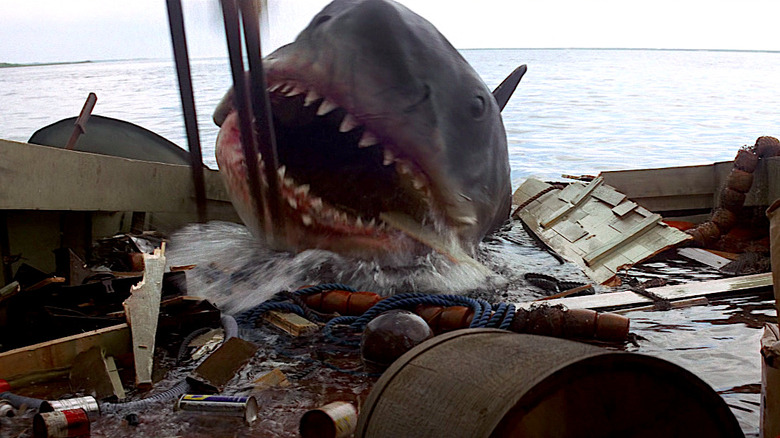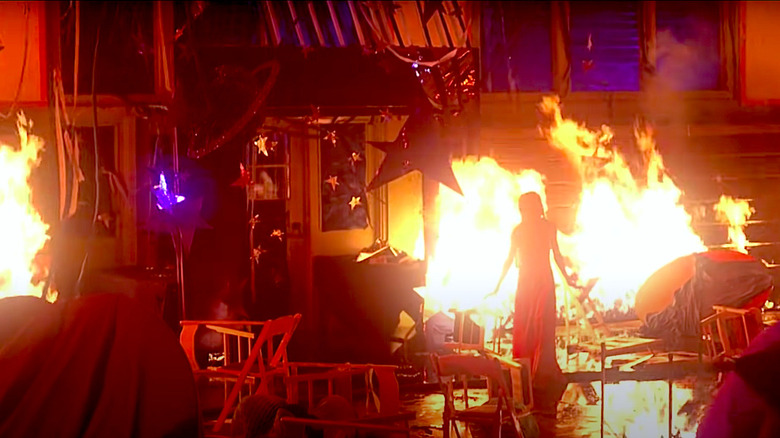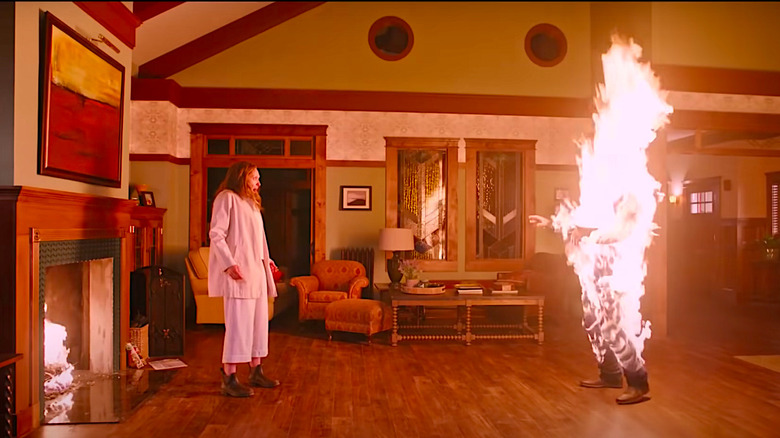5 Horror Movies We Think Should Have Won The Oscar For Best Picture
Since the first Academy Awards back in 1929, there have only been a handful of horror films ever nominated for Best Picture. That's nearly a century of great horror movies getting snubbed simply because they're ... well, horror. The consensus seems to be there have only been six horror films ever properly nominated for Best Picture — "The Exorcist," "Jaws," "The Silence of the Lambs," "The Sixth Sense," "Black Swan," and "Get Out" — and only "The Silence of the Lambs" has actually won the coveted award. If you ask me, that list should also include Guillermo del Toro's masterpiece "The Shape of Water" because it is essentially a monster movie, and what are monster movies if not beautiful, beautiful horror? But alas, the film is often labeled as "romance" or "fantasy" in order to avoid any of those icky horror connotations people have, thereby justifying its Best Picture win. Insert major eye roll here.
Any true horror lover knows the genre is so much more than just blood and gore. I mean, yes, we love the blood and gore, but usually there is a lot more going on than just cheap scares and stomach-churning visuals. Horror movies have provided some of the most excellent social commentary to ever grace the silver screen, and it's a shame the genre so often gets a bad rap. The spectrum of human experience is vast, and life can so often feel like horror, so why must we constantly turn away from it or call it "cheap" when really all it's doing is showing us another, albeit darker, side of ourselves? With that in mind, here are five horror movies that were definitely deserving of not only being nominated for, but also winning Best Picture.
Psycho
Of course this is on the list. To not include it would be a mortal sin. After all, what would horror be without the existence of Alfred Hitchcock's "Psycho?" When the movie debuted in 1960, it was extremely controversial. Some critics deemed it to be nothing more than shocking, but audience members were intrigued by the buzz surrounding the movie and flocked to the theaters to see it for themselves, ultimately making it Hitchcock's most commercially successful film. "Psycho" also managed to attract the attention of the Academy, which did nominate it for four awards — Best Director, Best Supporting Actress for Janet Leigh, Best Art Direction for a Black and White Film, and Best Cinematography for a Black and White Film — but it did not win in any category and was denied a Best Picture nomination altogether.
The movie pushed many of Hollywood's moral boundaries with its fixation on sexuality and violence. It went on to inspire countless other films in multiple genres, and it's sometimes considered to be the prototype for the first slasher. Janet Leigh's character, Marion Crane, is also often thought of as horror's first Final Girl, even though "final" for Marion means something a little different than it does for ladies like "Halloween" protagonist Laurie Strode and "A Nightmare on Elm Street" heroine Nancy Thompson.
If it had been nominated for Best Picture, it would have gone up against films like "The Apartment," and "Sons and Lovers." "The Apartment" went on to win Best Picture, and while it is still a beloved film to many cinephiles, "Psycho" is the film most likely to still get recognition from both cinephiles and non-movie obsessives alike. It has a cultural staying power that has managed to push beyond film buff discussions and enter into the common person's lexicon. Even if you've never seen the entirety of "Psycho," you most likely have heard of it and its infamous bathroom sequence, making it a horror movie with exceptional staying power. After all, you never forget your first shower murder scene do you, Mother?
The Texas Chain Saw Massacre
On one level, I completely understand why this film never got anywhere close to an Academy Award nomination. The Academy just simply was not (and is still not) ready for all of the horrible greatness that is Tobe Hooper's 1974 masterpiece "The Texas Chain Saw Massacre." For many, this can be a polarizing film. It's an intense 83 minutes of unrelenting violence and terror. But "The Texas Chain Saw Massacre" is truly a triumph for the way it handles not only its cinematography, but also the social commentary that pushes this movie beyond your average slasher.
When "Texas Chain Saw" arrived on the scene, America was experiencing multiple crises. At the time of filming, President Nixon was on the brink of his Watergate downfall, America was about to experience a major oil shortage, and the country was trying to get out of the Vietnam War. This was not a time to sit around all day eating head cheese and enjoying the afternoon breeze. Americans were struggling, and "Chain Saw" captures this struggle in the most brutal of ways. We see the effects of Nixon's America throughout the film, and the Sawyers can often be looked at as a family doing whatever they can — including brutal, insane murder and cannibalism — just to survive. Suspicion permeates the entirety of Hooper's film, and the hot, Texas atmosphere only adds to the stifling, trapped feeling that the characters — and most likely the viewers — experience.
On the surface, it's easy to dismiss "Texas Chain Saw" as nothing more than a gore fest, even though there's very little blood shed in the entire film. Viewers can get distracted by the overwhelming brutality of Leatherface and completely miss the social commentary that is at play underneath the saw buzz and animal bones. The film is way too extreme to have ever gotten a Best Picture nomination (That would be like if "A Serbian Film" was up for Best Picture back in 2011, which would have been a major "yikes" moment for all involved). And yet, I stand firm in my opinion that "The Texas Chain Saw Massacre" is one of the greatest horror films ever made. Sure, it probably would never have beaten "The Godfather: Part II" for a win, but then again, have you ever seen Al Pacino's Michael Corleone dance as beautifully with a chainsaw during a sunrise as Gunnar Hansen did as Leatherface? I didn't think so.
Jaws
The thing about "Jaws" is that it's a perfect film. It's also the only film on this list that was genuinely nominated for Best Picture. When it swam onto the scene back in 1975, people fell in love with the horror, yes, but they also loved those three fearless men aboard the Orca. Not only were Brody, Quint, and Hooper brave in their determination to go head to head with an oversized, man-eating great white shark, but they were also extremely distinct in their personalities. To watch "Jaws" is to fall in love with one (or all) of these three characters. We love them for their cocky attitudes and plucky, can-do mindsets, and we desperately want them to succeed in their task at eviscerating Bruce and his dozens of blood-stained teeth.
"Jaws" was nominated alongside some other heavy hitters like "One Flew Over the Cuckoo's Nest" and "Dog Day Afternoon." "Cuckoo's Nest" ultimately took the prize, but in a perfect world, that shiny, golden statue would have gone to "Jaws." The film is another amazing example of what can happen when you push the boundaries of horror and imagine outside the lines. "Jaws" is a masterclass in suspense (it takes over an hour for Bruce to make a full appearance on screen), and it thrills with its non-traditional setting. Horror movies so often exist quite literally in the shadows, but "Jaws" terrifies us in the middle of a sunny, summer afternoon.
It also has one of the best musical themes to signal the presence of the film's villain. In fact, the theme is so well known that people constantly reference those two menacing notes any time they see a shark, whether they've ever actually seen "Jaws" or not. In reality, there probably was no way that a movie about a murderous shark was ever going to beat out a film like "One Flew Over the Cuckoo's Nest" for Best Picture. Still, there's no denying that "Jaws" is a major cultural milestone in the horror genre, one deserving of a much bigger boat ... er, I mean award ... than it ultimately received.
Carrie
This list, admittedly, has quite a few films from the '70s, but that's because the '70s were just such a damn good decade for horror! 1976 saw the release of Brian De Palma's wildly inventive "Carrie," based on the Stephen King book of the same name. It is a fantastic movie about a young girl with telekinetic powers who is eventually pushed to the breaking point by her unaccepting classmates. What makes "Carrie" so great is Sissy Spacek's performance as Carrie White and Piper Laurie's performance as her extremely devout mother. Spacek approaches the role of Carrie with the perfect blend of naïveté and a pitying desire to be accepted by her peers. You both loathe her and feel for her, a girl trapped in adolescence by her misguided, commandeering mother. Laurie is equally as riveting as Margaret White, commanding the camera's attention whenever she appears on screen. If not for the talents of these two actresses, "Carrie" would not be the masterpiece that it is; the Academy agreed, nominating them for Best Actress and Best Supporting Actress, respectively.
However, one award the film did not receive an Oscar nomination for was Best Picture. That honor would go to films like "Rocky" and "Taxi Driver." It seems America wasn't quite ready to celebrate the emotional turmoil of a teenage girl, but if you ask me, it should have been. "Carrie" is a marvelous example of what can happen when a great book gets a great adaptation. It's also wonderful commentary on female adolescence and the horrors of being a teenager, and while most of us don't possess the ability to move things with our minds or make it rain stones, we do understand the cruel difficulties of growing up and going through high school. While Carrie the girl may have had a bucket of pig's blood dumped on her head at the prom, "Carrie" the movie is worthy of winning Prom Queen and escaping the stage crowned, celebrated, and entirely unscathed.
Hereditary
When the 91st Academy Awards came around, there were only a few movies nominated for Best Picture that, to me, truly felt worthy of the honor. "Green Book" was not one of these movies, and it ultimately went on to win the award, prompting me to scream so loud that I was probably in danger of getting evicted. This final entry is my desperate, desperate plea to create an alternate ending to what was otherwise a tragic ending to the Best Picture Oscar of 2019.
Ari Aster's first feature film, "Hereditary," is a masterpiece. It does everything I want a horror movie to do, including possessing the ability to make me forget that I'm even watching a horror movie to begin with. At its core, the film is about grief. Toni Collette gives a powerful performance as Annie Graham, a wife and mother who ends up experiencing multiple unimaginable tragedies. (Collette, who was not recognized in the Best Actress category, deserved a nomination just for her meltdown at the family dinner table alone.) "Hereditary" spends the majority of its runtime skirting the boundaries of horror by choosing to focus on the psychological aspects of grief, which is a choice that ultimately makes the movie so fantastic. Its horror lies in the everyday tragedy and trauma that families experience, and when the actual spooky stuff does start happening, you're almost relieved to have something unrealistic to cling to.
It's rare that I cry watching a horror movie, but "Hereditary" got me numerous times (especially during the whole "husband on fire" scene), proving that a scary flick doesn't just have to make you jump out of your seat. Plenty of horror movies before "Hereditary" have explored grief, and done so beautifully. "The Babadook" and "The Descent," are two wonderful modern examples, but "Hereditary" really shines because of how un-horror like it can often seem. Plus, few films will ever make you think twice about sticking your head out of the car window just to get some fresh air. The movie can function as a PSA for always remembering to carry your EpiPen with you, but it also stands as a wonderful example of why horror is so much more than just guts and gore.
